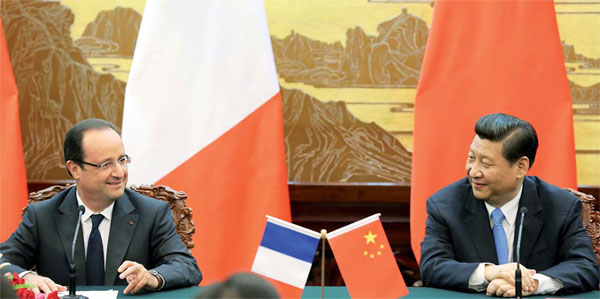Past points to future
Updated: 2014-01-24 08:52
By Li Xiang in Paris (China Daily Europe)
|
|||||||||||
|
Chinese President Xi Jinping and French President Francois Hollande meet with journalists in Beijing on April 25, 2013. Xu Jingxing / China Daily |
China, France should introspect and recast the way they see each other
When you step into the building of the old office of the late French president Charles de Gaulle in Paris, you immediately realize how connected he was with China.
On the wall of the hallway hangs a giant picture of a Chinese boy wearing an earphone and listening attentively to the audio guide at the exhibition on the life of the former French president held in Beijing 10 years ago when the two countries commemorated De Gaulle's momentous decision to recognize the new Chinese government in 1964.
Today the office is the headquarters of the Charles de Gaulle Foundation, which will send a 200-strong French delegation including current and former politicians, offspring of the de Gaulle family, business people and intellectuals to Beijing to celebrate the 50th anniversary of Sino-French diplomatic relations.
Anticipation is also high for Chinese President Xi Jinping's state visit to France in March, which is expected to emphasize the historic importance of Sino-French ties and to signal the desire to deepen the partnership between Beijing and Paris.
Although countries such as Sweden, Denmark and Switzerland established diplomatic ties with Beijing in the 1950s soon after the founding of the People's Republic of China, France was the first major Western power to forge relations with Beijing at the ambassadorial level.
To many Chinese, Paris' recognition of Beijing on Jan 27, 1964, was a historic breakthrough in China's diplomacy that helped reshape the bipolar world order imposed by the United States and the Soviet Union during the Cold War.
Now, both sides hope they can seize the opportunity to expand their half-century old relationship and discover the new reality of each other in a much more complex world.
While the balance of global power has shifted over the past few decades, the spirit of de Gaulle is still important as China and France look at the need to deepen their special partnership, which remains strong, diplomats and experts say.
"Sino-French relations still have special strategic significance today, and we need to send a strong signal to the world that both China and France are devoted to building a new, comprehensive strategic relationship," says Zhai Jun, China's ambassador to France.
De Gaulle's decision to establish diplomatic relations with China in 1964 was a visionary decision and a classic example of independent diplomacy, Zhai says.
"It not only broke down the barriers of ideology but was a reflection of inclusiveness and mutual respect of our different national conditions and systems."
Pierre Morel, former French ambassador to China, says there can be no "business as usual" in Sino-French ties. A solid and dynamic Sino-French relationship can contribute substantially to a more stable and cohesive multipolar world.
"Today we have a multipolar world but we still face the serious challenge of disorder. So we have to mobilize better thinking and action to improve the international system, and that's why I think a solid and dynamic Sino-French relationship can contribute a lot to that."
Pierre Picquart, a China observer and professor of geopolitics at the University of Paris VIII, says Gaullism, defined essentially by the idea of sovereignty and independence, still plays a role in France's multilateral diplomacy and remains a guideline for future Sino-French relations.
"The leaders of France and China must take advantage of this particular historic legacy to improve and raise our bilateral relations to a new level."
Since Sino-French relations were normalized 50 years ago, one of the biggest changes in the world has been China's economic success that has made it the world's second-largest economy, more than three times the size of the French economy.
Bilateral trade between China and France rose from $13.4 billion (9.9 billion euros) in 2003 to $51 billion in 2012, according to the Chinese Ministry of Commerce.
In 2012 France also became the top destination for Chinese investment in Europe as the investment value of Chinese companies accounted for 21 percent of the total amount in Europe, the French government's Invest in France Agency says.
Although business relations between the two countries have become increasingly intertwined, analysts say there is still huge unrealized potential. While France is the eurozone's second-largest economy, it is only China's fourth-largest trade partner in the European Union behind Germany, the Netherlands and the UK.
"The bilateral relationship is good but its potential is far from fully exploited," says Alice Ekman, China analyst at the French Institute of International Relations.
"Regarding economic cooperation, many French companies still hope to expand their presence in the Chinese market. At the same time, the internationalization strategy of major Chinese companies remains in its first stages of development in the French market."
Bridging the gap between small and medium-sized enterprises of China and France is one of the key ways in which the vast potential can be unleashed, analysts say.
In September a Sino-French business summit initiated by former French prime minister Jean-Pierre Raffarin will be held on the sidelines of the Western China International Fair in Chengdu, Sichuan province. The event will bring together about 1,000 Chinese and French SMEs.
"The key solution to balance France's investment relations with China is to concentrate on the SMEs," says Jacques van Minden, president of the consulting association Circle of France and China. "The large companies already have market access, and it is the SMEs that are in real need of help."
Analysts say that China's major economic reforms and institutional shake-up will also create new opportunities for Sino-French cooperation.
Today's Top News
More than 300 fall ill on Royal Caribbean ship
8.8% salary hikes expected for 2014
China turns the tables on gamblers
China takes measures against H7N9
Terrorists behind twin explosions in Xinjiang
2014 diplomatic strategy outlined at Davos
China reports another H10N8 case
Big events in the Sino-French relations
Hot Topics
Lunar probe , China growth forecasts, Emission rules get tougher, China seen through 'colored lens', International board,
Editor's Picks

|

|

|

|

|

|






